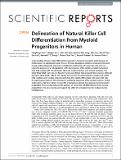| dc.contributor.author | Chen, Qingfeng | |
| dc.contributor.author | Ye, Weijian | |
| dc.contributor.author | Jian Tan, Wei | |
| dc.contributor.author | Yong, Kylie Su Mei | |
| dc.contributor.author | Liu, Min | |
| dc.contributor.author | Qi Tan, Shu | |
| dc.contributor.author | Loh, Eva | |
| dc.contributor.author | TE Chang, Kenneth | |
| dc.contributor.author | Chye Tan, Thiam | |
| dc.contributor.author | Preiser, Peter R. | |
| dc.contributor.author | Chen, Jianzhu | |
| dc.date.accessioned | 2015-12-23T16:17:49Z | |
| dc.date.available | 2015-12-23T16:17:49Z | |
| dc.date.issued | 2015-10 | |
| dc.date.submitted | 2015-07 | |
| dc.identifier.issn | 2045-2322 | |
| dc.identifier.uri | http://hdl.handle.net/1721.1/100500 | |
| dc.description.abstract | Understanding of natural killer (NK) cell development in human is incomplete partly because of limited access to appropriate human tissues. We have developed a cytokine-enhanced humanized mouse model with greatly improved reconstitution and function of human NK cells. Here we report the presence of a cell population in the bone marrow of the cytokine-treated humanized mice that express both NK cell marker CD56 and myeloid markers such as CD36 and CD33. The CD56[superscript +]CD33[superscript +]CD36[superscript +] cells are also found in human cord blood, fetal and adult bone marrow. Although the CD56[superscript +]CD33[superscript +]CD36[superscript +] cells do not express the common NK cell functional receptors and exhibit little cytotoxic and cytokine-producing activities, they readily differentiate into mature NK cells by acquiring expression of NK cell receptors and losing expression of the myeloid markers. Further studies show that CD33[superscript +]CD36[superscript +] myeloid NK precursors are derived from granulo-myelomonocytic progenitors. These results delineate the pathway of human NK cell differentiation from myeloid progenitors in the bone marrow and suggest the utility of humanized mice for studying human hematopoiesis. | en_US |
| dc.language.iso | en_US | |
| dc.publisher | Nature Publishing Group | en_US |
| dc.relation.isversionof | http://dx.doi.org/10.1038/srep15118 | en_US |
| dc.rights | Creative Commons Attribution | en_US |
| dc.rights.uri | http://creativecommons.org/licenses/by/4.0/ | en_US |
| dc.source | Nature Publishing Group | en_US |
| dc.title | Delineation of Natural Killer Cell Differentiation from Myeloid Progenitors in Human | en_US |
| dc.type | Article | en_US |
| dc.identifier.citation | Chen, Qingfeng, Weijian Ye, Wei Jian Tan, Kylie Su Mei Yong, Min Liu, Shu Qi Tan, Eva Loh, et al. “Delineation of Natural Killer Cell Differentiation from Myeloid Progenitors in Human.” Scientific Reports 5 (October 12, 2015): 15118. | en_US |
| dc.contributor.department | Massachusetts Institute of Technology. Department of Biology | en_US |
| dc.contributor.department | Koch Institute for Integrative Cancer Research at MIT | en_US |
| dc.contributor.mitauthor | Chen, Jianzhu | en_US |
| dc.relation.journal | Scientific Reports | en_US |
| dc.eprint.version | Final published version | en_US |
| dc.type.uri | http://purl.org/eprint/type/JournalArticle | en_US |
| eprint.status | http://purl.org/eprint/status/PeerReviewed | en_US |
| dspace.orderedauthors | Chen, Qingfeng; Ye, Weijian; Jian Tan, Wei; Mei Yong, Kylie Su; Liu, Min; Qi Tan, Shu; Loh, Eva; TE Chang, Kenneth; Chye Tan, Thiam; Preiser, Peter R.; Chen, Jianzhu | en_US |
| dc.identifier.orcid | https://orcid.org/0000-0002-5687-6154 | |
| mit.license | PUBLISHER_CC | en_US |
| mit.metadata.status | Complete | |
